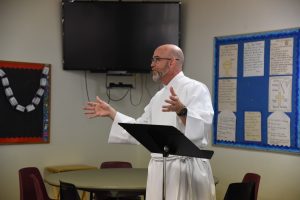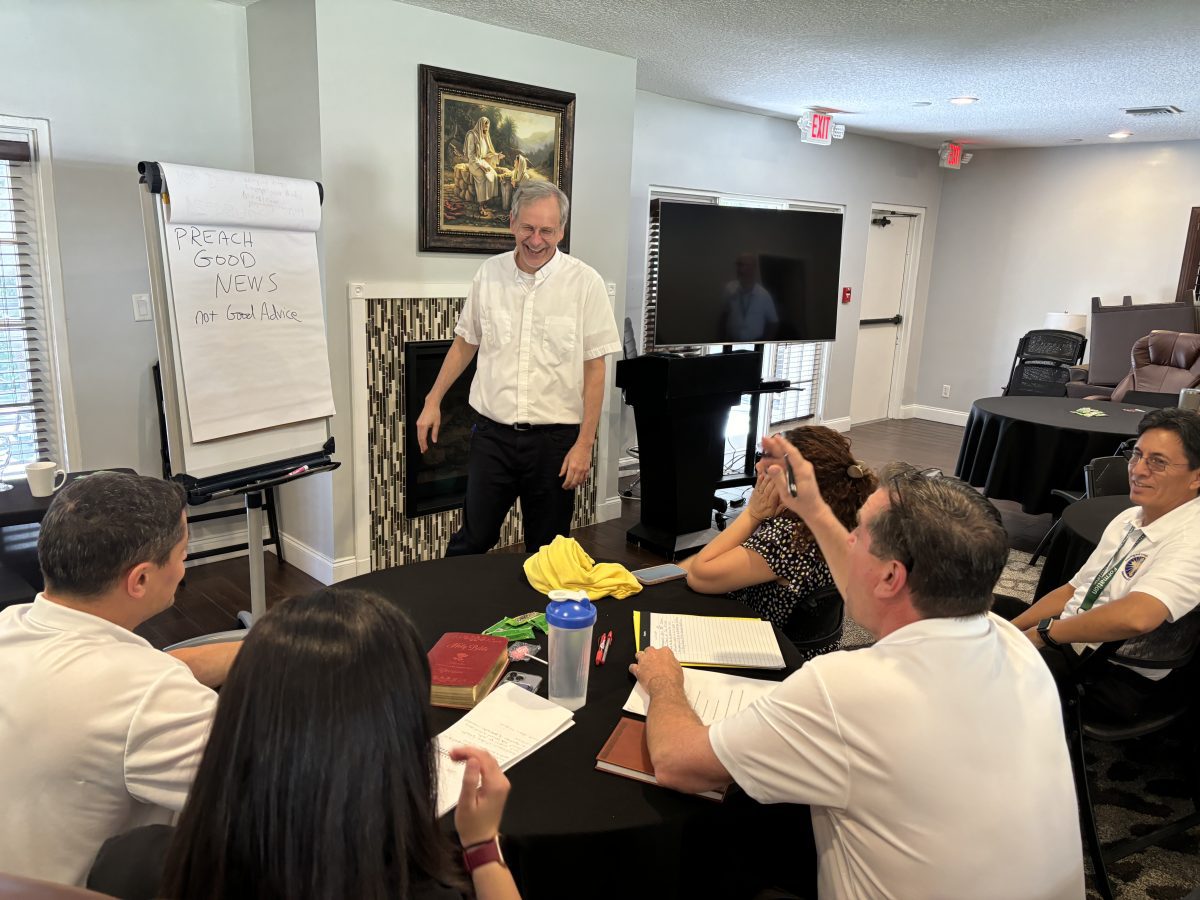ORLANDO | Bishop John Noonan will ordain 18 men to the Order of Deacon, June 8. Although all have distinct experiences, characters and charisms, they are all well formed. The formation program, 15 years in the making, is as distinct as they are.
When the 2022 National Directory for the Formation, Ministry, and Life of Permanent Deacons was released, the Diocese of Orlando met 85% of the requirements. The team quickly went to work to raise the bar even higher.
Deacon Joe Gassman, secretary for Leadership and Parish Life, and Deacon Dave Camous, director of the Permanent Diaconate for the Diocese of Orlando, credit their predecessors, Deacons David Gray and John Rumplasch, for creating a strong foundation. The duo improved the discernment year and brought in St. Leo University for better theological preparation. Deacon Gassman then applied his 25 years of human resources training to the formation program, adding things like psychological screenings to reveal underlying problems that could hinder service.
“We’re not teaching people to be deacons,” Deacon Gassman said. “We’re helping them discover the deacon that already exists within and sacramentalize the discovery through ordination. Human formation has been the cornerstone of our program.”
He said many candidates join formation as successful businessmen hoping to “fix” people. In reality, they’re “coming in to surrender,” Deacon Gassman said. “Every great saint has said, ‘Know thyself first and there’s where you’ll find God within.’ And that’s when you can share the Good News because you don’t get in the way.”
Deacon Camous added that formation needs to include the four dimensions: human, spiritual, intellectual and pastoral.

“There is this integrative whole because we’re forming a person. We’re not just forming a mind,” he said. “We’re not just forming a heart. We’re not just forming hands. We’re not just forming a soul. We’re forming an entire person who’s asking to be configured as the icon of Christ the Servant in his community.”
Today the diaconate formation program has one discernment year and five years of formation. Year two focuses on self-identity. Aspirants delve into their Christian identity, marriage, sexuality and explore Catholic social justice. “Those are all part of a lay Christian’s identity which are also fundamental to the diaconate,” Deacon Camous explained.
Year three addresses communication in ministry, listening skills, cross-cultural communication and the language of liturgy and music. Later, relationships are explored along with conflict in ministry, how a family lives the diaconate vocation, negotiating parish life, servant leadership and more.
The final year is all workshops, liturgical practicum and sacramental preparation, things that were missing in earlier programs. This format for the intellectual dimension provides either certification or a master’s degree in theology through St. Leo University. Wives of the men in formation may also apply to earn the degree or certificate. This is yet another distinction. Many programs do not include wives. Or if they do, it is for selective events.
“We learned long ago that if it’s truly formation, the men will be formed and grow. If their wives are not in formation, they can grow apart,” said Deacon Camous as he recalled his own formation. His wife, Rosie, stayed home to take care of their young children. Two years in, they noticed the change in their relationship. Thanks to their parish youth program which stepped in for childcare, Rosie was able to join him. “That helped us go on the journey together,” he said.
Candidate George Torres came to the diocese from another program where his wife, Angie, was not invited. He restarted the program in Orlando and said he was grateful he and his wife went through it again together.
“The cool thing is, this is what the National Directory specifically calls for,” Deacon Camous said. But it wasn’t enough. To meet the guidelines more closely, Deacon Camous and Deacon Gassman had a “gap analysis” done to reveal other areas of the program that might miss the mark.
Homiletics needed work as many priests felt deacons were not prepared to preach. This portion of formation has improved greatly. Father David Scotchie, who has a doctor of ministry in preaching from the Aquinas Institute of Theology, continues to expand the course’s scope of understanding and practice. Candidates now learn various styles and practice writing and delivering more homilies. Father Scotchie, facilitators, peers, and wives critique homilies for
content, message clarity, relatability, sound theology, and connection with the congregation. Then candidates continue practicing delivery until the end of the program.
To better match the directory’s guidelines, Deacons Camous and Gassman are also working with the University of Dayton to enhance formation participants’ understanding of the diverse cultures to whom they will minister. They will be implementing a post ordination segment to accompany deacons through their first year.
Bishop Noonan is a fervent supporter of the evolution of the diaconate program.
“Because I was the rector of a seminary, I know if you don’t use all four pillars, you’re not going to get the right outcome. It’s like telling Henry Ford to assemble a car, but don’t put wheels on it. You really need all the four pillars because all of them are part of who you are as a person.”
He said he is blessed by the work of so many who continue to refine diaconate formation in the Diocese of Orlando. “They’ve done a great job of building on our foundation,” he said. “Every year we look at it and say, what can we do to help? It’s because we don’t just take anybody. It’s a process of discernment.”
Bishop Noonan believes this is what has changed the most since the 1970s. “It’s even changed for (the) priesthood,” he noted. “Now it’s a process of psychological assessments, letters of recommendation, and more detailed screening(s).”
Deacon Joseph Bellissimo was ordained in 2022. A product of this new, integrated formation, he said it gives him the confidence to serve as God wills it. “I know God’s hand was in my formation here,” he said, having almost entered a program in another state. “The first thing you discover in formation, depending on where you go, is who you are,” he said. “Everybody’s been invited to be an imitator of Christ Jesus and a servant… (Formators) are not just making deacons. They’re not making anything. They’re validating men who were already dedicated to God and giving them the tools and gifts to be what they already are, but better imitators of Christ.”
For information on the diaconate, call 407- 246-4898. All are invited to the permanent diaconate ordination at the Basilica of the National Shrine of Mary, Queen of the Universe, 8300 Vineland Ave., Orlando June 8, 2024, at 10 a.m.
By Glenda Meekins of the Florida Catholic staff, April 25, 2024

